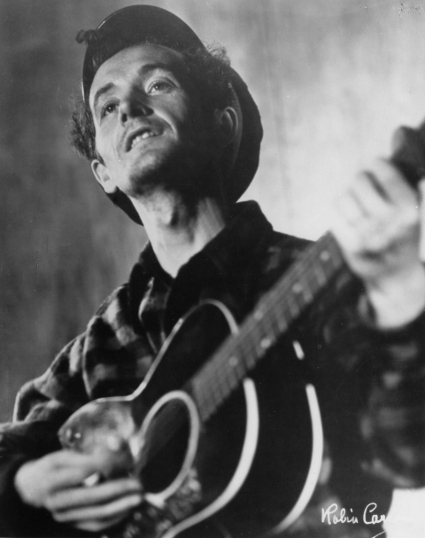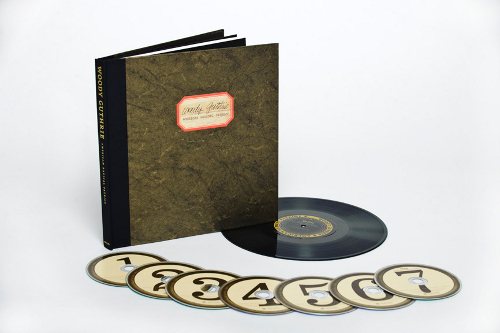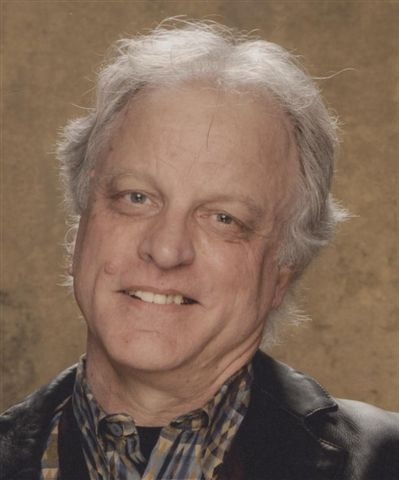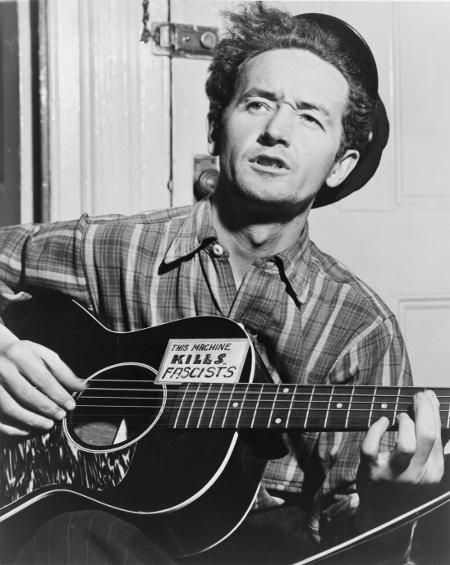Remarkably vast yet endearingly earnest, the brand-new, limited-edition Woody Guthrie box set, American Radical Patriot -- released this week -- puts into renewed perspective the folk troubadour, humanitarian, and (as the title plainly suggests) complex citizen. Comprising the singer-songwriter's full five hours of 1940 Library of Congress recordings -- released here in toto for the first time -- this collection, recorded by Guthrie at that poignant age of 27 (unlike some musicians, he survived), delivers a wonderfully rich portrait of the artist. His early renditions of classics such as "Pretty Boy Floyd" and "I Ain't Got No Home" prove revelatory amidst conversations with folklorist Alan Lomax, as songs and stories intertwine.
The 80-plus-song, 6-CD set also includes further Guthrie treasures sure to please the faithful and enchant the neophyte: a never-before-released recording (a minor-key "Pastures of Plenty") as one of 17 tracks from his musically fruitful days as a Bonneville Power Administration employee, 10 big anti-VD songs he wrote and performed for the U.S. Public Health Service (can you imagine Justins, Bieber or Timberlake, doing that?), anti-fascist anthems with the Almanac Singers, radio dramas (!), and more. A 78-rpm vinyl disc featuring Bob Dylan covering Guthrie's "VD City" (!!) plus a DVD, previously unreleased Guthrie photos and drawings, complete PDF transcripts and 60-page hard-copy version of the accompanying 258-page electronic book round out the handsomely-packaged set.
I spoke with the author of that book and producer of this collection: historian, Rounder Records co-founder (and Red Sox aficionado) Bill Nowlin, who discussed the Guthrie legacy contained herein.
"The idea for the book really came from Nora Guthrie (Woody's daughter)," Mr. Nowlin explains. "We put out a few albums of Woody Guthrie material over the years, on Rounder, and we got into a conversation with her and various people from the record company. In the course of the conversation we'd talk about future ideas, and she mused about the idea of Woody Guthrie and his relationship with the government.
"I'm a former professor of Political Science; I have that kind of background. So it resonated with me right away: the idea about Woody's feelings about the government, his attitude toward the government, and the fact that when you actually look at it -- as Arlo Guthrie (Woody's son) himself said -- some of his most inspired work was done for government agencies."
The rave on this deluxe package itself comes from none other than socially-conscious television producer Norman Lear, who notes: "You listen to Woody at the risk of being won over to the cause of working Americans and the understanding that their cause is yours as well."
I ask Mr. Nowlin about the applicability of Mr. Guthrie's music today. He references Woody's stories in the Library of Congress collection.
"When they sent us all the recordings, it was just really a treat to hear him talk -- about experiences which in some cases we will never have -- some of them hopefully we will never have: like having the entire state of Oklahoma covered with dust: and hundreds and thousands of people having to leave their homes and go to California because their farms were completely...all the topsoil blew away.
"Through his songs, and through his spoken-word comments," Mr. Nowlin continues, "Woody is looking at the relationship of a citizen to his or her government. And in this case, he was an American citizen -- he was named after an American president. He knew that government could do good for people, but he also knew that government could present problems. For instance, the migrant workers had left Oklahoma to go to California -- they were looking for somewhere they could settle where there was some possibility of sustenance, and of being able to get a new start.
"There were roadblocks, after a while, because there would be so many of them -- I mean, I can understand why -- but you have these same kinds of problems in Lebanon today, and Jordan -- with thousands of Syrian refugees coming across the border -- but these were Oklahoman refugees, coming to California.
"They actually put up government roadblocks, and tried to prevent them from coming in, or put them into camps of one sort or another to at least corral them, so to speak. And in some cases help them get food there, too -- I mean, it wasn't always necessarily heartless -- but it was a significant social problem that had to be dealt with one way or another, and sometimes it had rough edges -- and some people felt abused -- just as government often took the side of big-business organizations who were trying to keep labor costs down.
"And Woody was active at a time of labor organization, where unions, like the AFL and CIO that hadn't quite joined together yet -- they were all trying to organize workers, basically to get better pay, better working conditions, and so forth -- and naturally there's a reaction to that from businesspeople who'd rather keep labor costs down. There's an inherent tension there. The government was often enlisted on the side of the more powerful, as opposed to the disunited and more disadvantaged, and Woody was, of course, opposed to government, at times such as that."
I bring up Woody's B.P.A. songs, during the writing of which he was clearly more pro-government.
"Yet, jumping to the Bonneville Power Administration, up in the Pacific Northwest, here was government promoting rural electrification. They would come in, they would create dams on the Columbia River, and the Bonneville River, and put up dams to generate electric power which then could be distributed to people that had no access to electricity -- for all the benefits that electricity provides for us."
Mr. Nowlin knows much about Mr. Guthrie. I ask about how the latter might have defined himself.
"There was a very, very strong Socialist movement at that point -- and we had people running for President who were getting millions of votes, a little bit earlier in the century," Mr. Nowlin says. "He was very close to even elements of the Communist party, which was a significant force, especially right at the time of the Depression -- when it first hit. Some of the excesses of Stalinism hadn't become known at that point, so there was definitely a certain part of the American population that looked to the grass being greener, maybe, in the Soviet Union -- without realizing exactly what was going on over there," Mr. Nowlin laughs, as only a professor can.
He's an interesting man himself, this Bill Nowlin. I ask how his record label launched, and how he "got into" Woody Guthrie.
"We started Rounder back in 1970, myself and my college roommate, Ken Irwin, with Marian Levy. When we were in college from '62-'66, we had a couple of recordings of Woody's. So our interest in him and awareness of him goes back, at this point, 50 years -- when we were sophomores in college. We never saw him, but we were well aware of him -- and our lives slightly overlapped in that regard."
"The integrity of the music has always been really important to us," he explains of Rounder's quality releases, "and if we thought we were misrepresenting an artist, or not giving them primacy, if we weren't able to do that, we'd kind of back away from a project.
"I'm talking about even artists that have never recorded before. But when you come to somebody like Woody Guthrie, who -- when we came across him fifty years ago -- was already a legend, you clearly have a responsibility there. You can't just throw out anything. First of all, you'd make a fool of yourself. But he's got a serious message -- not necessarily in terms of diatribe. There's a direction in thought -- he's not so instructive as inspirational."
He refers to his new book, attending the album: "And of course I wanted to work on something that would be enduring -- that people who already knew Woody would read and say, 'Geez, I never thought of it that way before.' Or be happy to find things in there that were completely new."
Woody Guthrie: American Radical Patriot is available from today going forward.
Photos courtesy of Woody Guthrie Publications, Inc.; and Bill Nowlin



